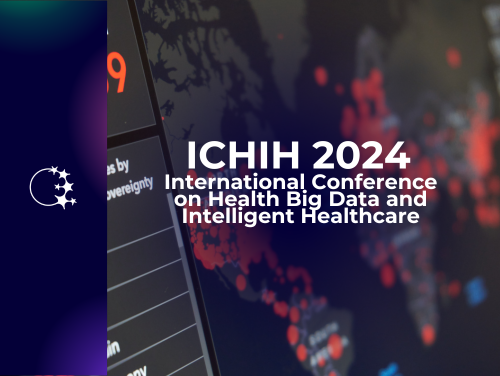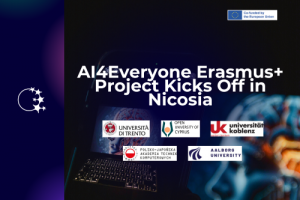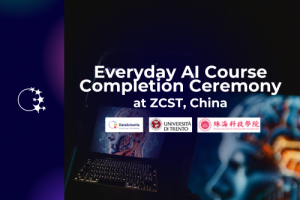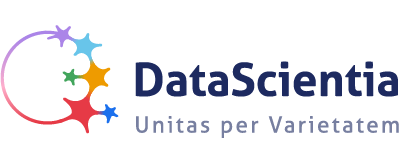
Data-Centric, People-Centric AI for Health
- Posted by Tetiana Bihun
- Categories News
- Date January 8, 2025

Fausto Giunchiglia, the founder of DataScientia, attended the 3rd International Conference on Health Big Data and Intelligent Healthcare (ICHIH 2024) in Zhuhai, China, to present DataScientia’s innovative approach to using AI for health and well-being.
The ICHIH 2024 focuses on the latest advancements in health big data, intelligent healthcare, and AI technologies. It brings together global experts, researchers, and practitioners to share research, explore emerging issues, and discuss innovations in healthcare.
At ICHIH 2024, Fausto Giunchiglia discussed how DataScientia uses AI to unite diverse communities for more effective sharing and learning from health data. This collaborative exchange facilitates the development of personalised healthcare solutions that consider cultural differences. Fausto emphasized the vital role that scholars from around the world play in collaborating to create innovative solutions for global health challenges.
During the conference, Fausto showcased DataScientia’s human-centric approach to collecting and creating rich datasets by using health data from global citizens. To share DataScientia’s experience and knowledge in advancing healthcare through technology, Fausto highlighted our innovative, data- and people-driven projects that improve disease prediction and enable personalised treatments by combining genetic, environmental, and behavioural information.
Fausto first discussed the Italy-Scotland Anticoagulant Study (2017-2018), which addressed the challenges of cross-border healthcare data sharing. By using a scalable knowledge architecture with graph integration, the study enabled seamless, compliant data integration between Italy and Scotland, contributing to the advancement of precision medicine. The key goal for these datasets is to improve disease prediction and enable personalized treatments. With this, DataScientia advances precision medicine by combining genetic, environmental, and behavioral information.
He also presented the Healthcare Data Safe Havens initiative (2016-2018), which focused on overcoming legal, linguistic, and technological challenges in cross-jurisdictional healthcare data sharing. This initiative developed a scalable architecture tested in the Scotland-Italy study and is now expanding to support broader European interoperability.
Another significant effort was IntEropHRate Project (2019-2023), which aimed to create a patient-centric European-scale Medical Wallet. This project enables the secure sharing of standardized health data across borders, improving emergency care, facilitating research participation, and giving patients greater control over their health data. It also ensures privacy compliance.
Fausto also highlighted WeNet Project (2019-2023), which gathered global behavioral data from wearables and self-reports. With over 23,000 participants, the project leveraged AI to provide personalized health recommendations, including tailored exercise plans to manage weight and reduce chronic disease risks.
In his speech, Fausto explained how Data Scientia promotes a more connected, personalized healthcare system and contributes to the Citizen Science community. The Data Scientia community develops through exchanging ideas across a global network. People learn about AI and data, explore their relevance to local communities, and apply this knowledge to create innovative solutions, empowering citizens to contribute to research, improve data quality, and foster global collaboration.
Fausto encourages researchers and communities to actively design experiments and to focus on generating, sharing, distributing, and analyzing high-quality data. He stresses the importance of a global community, using DataScientia as an example of an initiative that partners with universities and innovation hubs to find sustainable solutions while also involving citizens and educators in continuous learning. These are essential steps toward building trustworthy AI systems and improving global health outcomes.
Health is a vital foundation for the well-being of all humans and requires inclusive participation. Diverse perspectives and lived experiences are essential for creating effective and culturally aware solutions.
We believe that AI can serve people meaningfully, and we will continue to expand our efforts.
Be part of DataScientia’s mission to shape a future where AI serves everyone — together, we can turn this vision into a global reality. Follow our news to stay connected with our intiatives!
Keywords: healthcare data sharing, precision medicine, genetic data, environmental data, behavioral data, cross-border collaboration, data integration, scalable knowledge architecture, graph integration, European interoperability, patient-centric, Medical Wallet, emergency care, research participation, privacy compliance, wearable data, AI-driven health recommendations, chronic disease prevention, personalized treatments, data-driven healthcare.

────────────────
Tetiana Bihun
Author, Content Creator
Tag:LiveData, LivePeople
You may also like

AI4Everyone Erasmus+ Project Kicks Off in Nicosia

Everyday AI Course Completion Ceremony Held in Zhuhai, China


